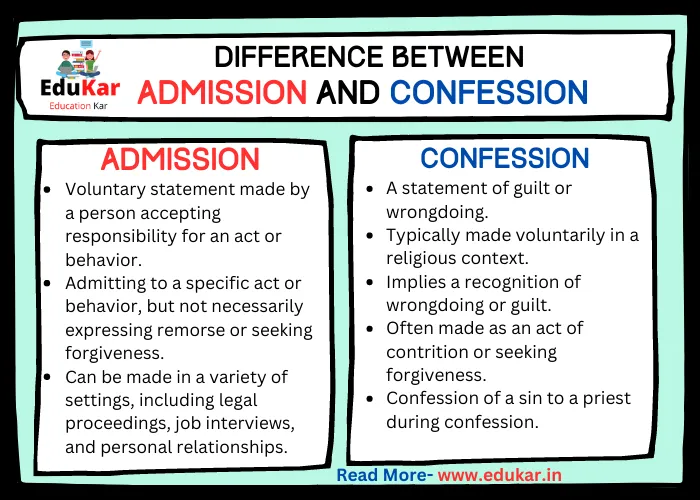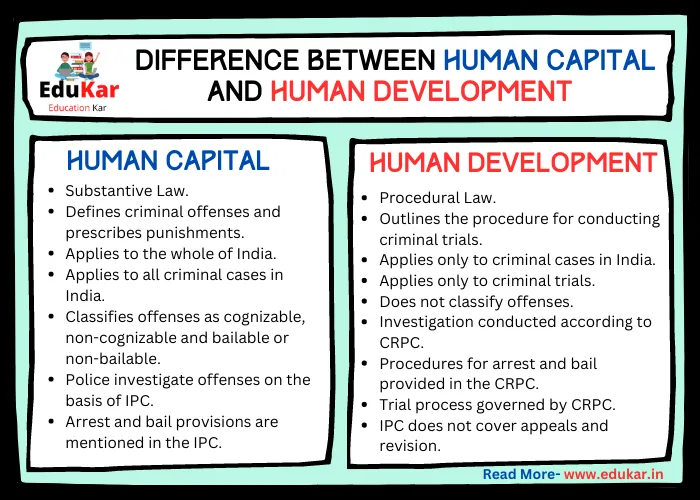Contents
- 1 Introduction
- 2 Definition of Admission
- 3 Definition of Confession
- 4 Differences between Admission and Confession
- 5 Similarities between Admission and Confession
- 6 Conclusion
- 7 FAQs
- 7.1 What is admission?
- 7.2 What is confession?
- 7.3 What is the main difference between admission and confession?
- 7.4 Can admission be used as evidence in court?
- 7.5 Can confession be used as evidence in court?
- 7.6 What is the role of admission and confession in religious contexts?
- 7.7 Can admission and confession be used interchangeably?
Learn about the key differences between admission and confession, two terms often used interchangeably but with important differences. Whether you’re navigating legal or personal situations, understanding the these two words can help you communicate more effectively and achieve better outcomes.

Introduction
Admission and confession are two terms that are often used interchangeably but are quite different in their meanings and implications. Admission refers to the act of acknowledging a fact or truth, while confession involves the admission of guilt or wrongdoing. Although these terms might seem similar, they have important differences in their legal and social contexts.
Also Read: Difference Between Reflex Action and Walking
Definition of Admission
Admission is the act of acknowledging a fact or truth. This can be done verbally or in writing, and it can apply to a variety of situations. For example, admitting to being late for a meeting, admitting to making a mistake, or admitting to having a medical condition. In most cases, admitting to something is not illegal or immoral, and it can often be seen as a positive thing.
Definition of Confession
Confession involves the admission of guilt or wrongdoing. Confessing to something implies that the person has done something illegal, immoral, or unethical. In the legal context, a confession is a statement made by a person admitting to the commission of a crime. A confession can be made to law enforcement officials or in a court of law.
Differences between Admission and Confession
| Admission | Confession | |
|---|---|---|
| 1. | Admission refers to acknowledging or owning up to an act. | Confession refers to admitting to wrongdoing or sin. |
| 2. | Admission can be voluntary or involuntary. | Confession is usually voluntary. |
| 3. | Admission may not always carry a sense of guilt or remorse. | Confession usually implies a sense of guilt or remorse. |
| 4. | Admission can be made to anyone, not just an authority figure. | Confession is typically made to a religious figure or authority figure. |
| 5. | Admission is often made in non-religious contexts. | Confession is typically made in a religious context. |
| 6. | Admission can refer to any type of act, not just a moral or ethical one. | Confession is usually associated with moral or ethical wrongdoing. |
| 7. | Admission may be made to avoid punishment or consequences. | Confession is often made as a means of seeking forgiveness. |
| 8. | Admission may not have any impact on one’s moral or spiritual standing. | Confession is often seen as a means of improving one’s moral or spiritual standing. |
Similarities between Admission and Confession
Despite their differences, admission and confession share some similarities. Both involve the act of acknowledging a truth, and both can be important in personal and professional relationships. Admitting to a mistake, can help to build trust and credibility in a professional setting, while confessing to a wrongdoing can help to repair a damaged relationship.
Also Read: Difference Between Delegation and Decentralization
Conclusion
Understanding the difference between admission and confession is crucial, especially when dealing with legal matters or personal relationships. Admission is said to acknowledging a fact or wrongdoing, while confession involves admitting to a wrongdoing or crime. Admission may be voluntary or involuntary, and it may not necessarily imply guilt or responsibility, whereas confession is typically an admission of guilt.
It is important to note that both admission and confession can have legal and personal consequences, and therefore, one should be cautious when making either. Admitting to a mistake or wrongdoing may be necessary for personal growth and building trust in relationships, but it is important to seek legal advice before making any admissions in a legal context.
FAQs
What is admission?
Admission is the act of acknowledging or accepting a fact or statement as true. It can be voluntary or forced and does not necessarily imply guilt or wrongdoing.
What is confession?
Confession is the act of admitting to a wrongdoing or fault. It is usually voluntary and is often made in the context of a legal or religious setting.
What is the main difference between admission and confession?
The main difference between admission and confession is that admission can be made without implying guilt or wrongdoing, while confession is specifically made to admit to a wrongdoing or fault.
Can admission be used as evidence in court?
Yes, admission can be used as evidence in court, but it does not necessarily prove guilt or wrongdoing. Admission can also be challenged or explained in court by the person who made the admission.
Can confession be used as evidence in court?
Yes, confession can be used as evidence in court, but it must be made voluntarily and without coercion. Confession can also be challenged or retracted in court by the person who made the confession.
What is the role of admission and confession in religious contexts?
Admission and confession play an important role in religious contexts such as confessionals, where people admit or confess their sins or wrongdoings to a religious leader or authority. This allows individuals to seek forgiveness and make amends for their actions.
Can admission and confession be used interchangeably?
No, admission and confession cannot be used interchangeably as they have different meanings and implications. Admission does not necessarily imply guilt or wrongdoing, while confession specifically involves admitting to a wrongdoing or fault.
















